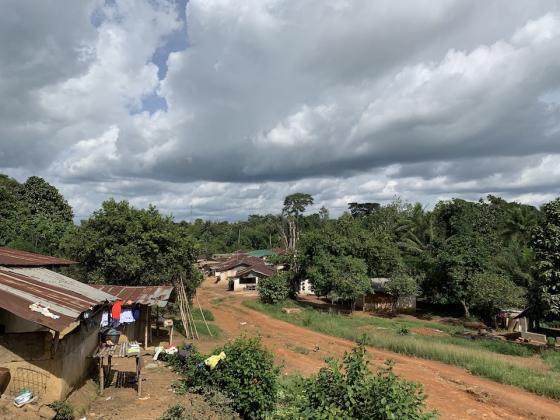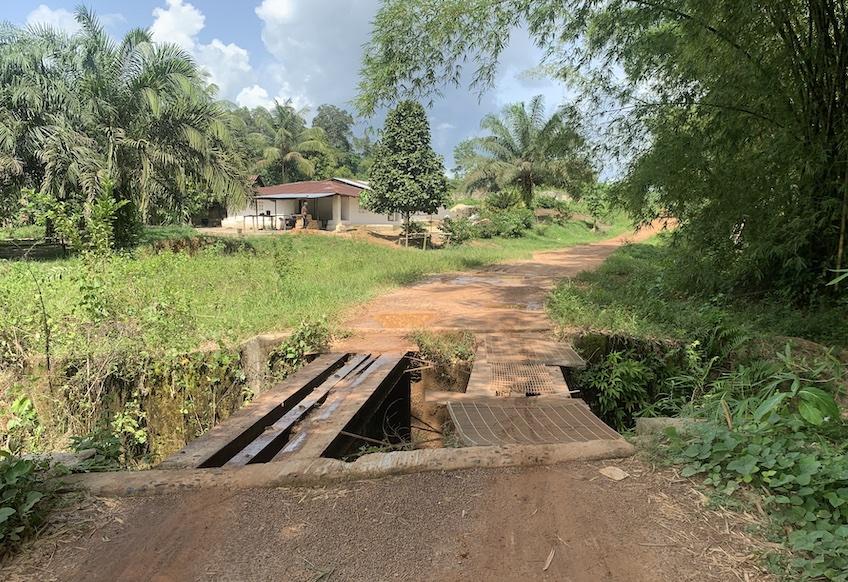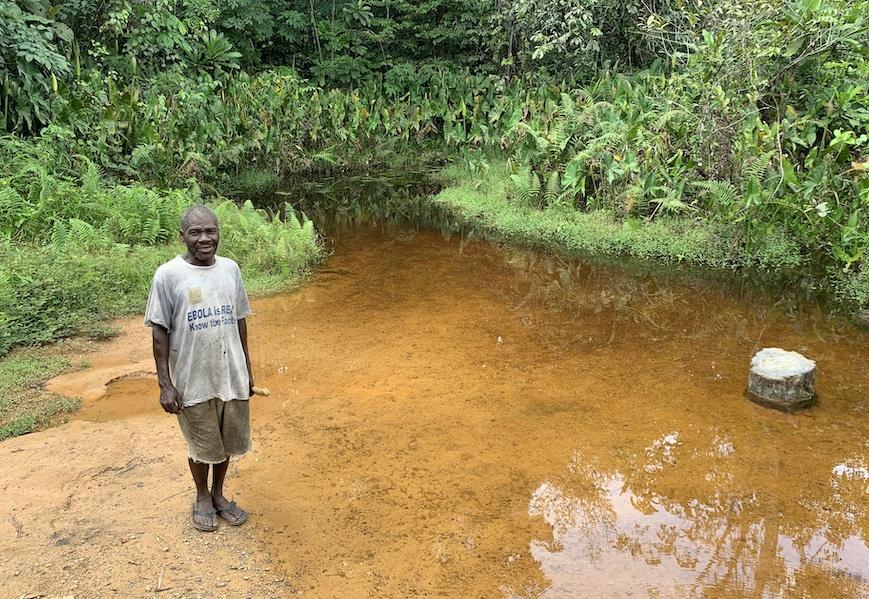Liberia: Abandoned Dreams, Fighting for Survival

An overhead view of Koon Town in Todee District’s, where more than 32,695 inhabitants, live on farming and motorbike transport as primary and secondary economic activities — as they grapple with extreme poverty, and limited opportunities for many citizens who aspire for a better future.
... In Todee District, poverty means dreams are hardly achieved, and decades of neglect have resulted in basic social services such as safe drinking water, decent health facilities, and high schools being in short supply.
When Odaphus Momo graduated from high school a few years ago, he had a plan — to attend college, graduate, and become a medical doctor.
But poverty in Todee District, Montserrado’s largest district, with 475 towns and villages, means Odaphus could not raise the necessary funds to pursue higher education. Instead, he became a motorcyclist, a part-time teacher, and a subsistence farmer — surviving on the little money he makes from his less-than-ideal career paths.
Odaphus, like many of Todee District’s more than 32,695 inhabitants, live on farming and motorbike transport as primary and secondary economic activities — as they grapple with extreme poverty and limited opportunities for many citizens who aspire for a better future. In Todee, as it is in most poor areas across the country, the scale of inequality — the phenomenon of unequal and/or unjust distribution of resources and opportunities — is becoming extreme.
The World Bank estimates that 50 percent of Liberians live below the poverty line and a sizable number live in extreme poverty.
“Being born and living in Todee is harder than you think. Poverty here starts at birth as families live in poor households and cope with gross deprivation. Our poverty is outrageous because it has been growing in the context of an expanding economy for the county but the benefits have been reaped by a minority of people, and have bypassed the majority of the population,” Odaphus, a resident of Blackie Town, Todee District, told the Daily Observer.
“The growing level of poverty in the country, which is the result of inequality, is serious and Todee is a clear example,” he added. “But the issue is the least talked about. Nearly half of Todee inhabitants are born in poverty, then live in poverty and die in poverty. It is a generational thing,” he says.
Odaphus, who is 31 years old and a father of three, decried the limited opportunities that exist for many Liberians who are forced to make a living from motorbike transport and other activities in the informal sector, where returns remain low.
“It is sickening that every day, the disparity between the rich and poor in Liberia is increasing – at the same time; the quality of life is on a decline among the poor. I never dreamed of becoming a coal producer, but here I am doing it today. Poverty forces us to abandon dreams and fight for survival. Here, things are very much difficult. We work hard to survive," Odaphus added.
Poverty in Liberia, according to the World Bank, remains widespread, with more than half of the population 50.9 percent below the national poverty line — citing the 2016 Household Income and Expenditure Survey — as this figure translates to roughly 2.3 million Liberians who are unable to meet their basic needs.
Around 68 percent of the country poor live in rural areas where poverty incidence is 71.6 percent, more than twice as high as in cities (31.5 percent), the Bank said in its Poverty & Equity Brief on Liberia, updated April 2021. The Bank added that 44 percent of the population lived under the extreme international poverty line of US$1.90 per day and that the proportion of poor households living below the international poverty line was projected to increase to 52 percent in 2021.
Also, IMF Staff Country Reports Volume 2021 noted that widespread poverty and inequality undermine the country's most valued asset, preventing people from achieving their potential — facing some form of income or food insecurity and vulnerability.
It added that while the Government of Liberia sees pervasive poverty, inequality, and widespread deprivation as the greatest restraint to sustaining the peace and accelerating growth and sustainable development; poverty and vulnerability have both geographic and demographic dimensions because of the historical patterns of growth and development.
Citing data from the Liberia Institute of Statistics and Geo-Information Services (LISGIS), the IMF estimated that, about 3 million Liberians (70.1 percent) were multidimensionally poor (deprived of development) and another 924,000 are near multidimensional poverty. And just as the IMF said, Todee, which consists of several clans and chiefdoms, has for decades been deprived of development — having only one administrative building, as well as a single court and a police station.
The district, which is about a 45 minutes drive from Monrovia, the country’s capital, lacks a university or college while basic social services such as safe drinking water, decent health facilities, and high schools are still in short supply. In an emergency, people have to travel several kilometers to get to the police station or to the count in Nyehn Town, the district headquarters.
Todee is Montserrado’s largest district, yet its inhabitants have for decades been deprived of development. Entire towns and villages of the district are hardly accessible due to bad roads — a situation that is worsened during the rainy season. In Todee, only a few towns have hand pumps but the larger population gets their drinking water from creeks. Because water is scarce, a bag of sachet mineral water is sold for L$10. Those who cannot afford, have to drink from the stream closest to them.
One badly affected town is Blackie Town, which lacks almost everything: no clinic or police station and worse, bad road problems. If someone is sick, Blackie Town inhabitants will have to travel for miles just to seek medical care. And if the issue is related to crime, then the distance becomes longer.
“Look around you; nothing is there,” says Blackie Town Chief, James Kpanah. “No safe drinking water, no roads, no toilets, no clinic, we must go to another town to seek medical treatment, no police station.”
Chief Kpanah, who is also a farmer, claims that their children are dying from waterborne diseases, which many cannot afford to treat.
Some time ago, the Government of Liberia introduced the drug revolving funds policy. The new strategy aims to replenish pharmaceuticals served to patients visiting public health centers, while also addressing drug shortages in the facilities. The strategy, according to Health Minister Wilhelmina Jallah, began in January 2021.
She stated that, unlike in past years when Liberians were given free medications at government-run health centers, they will now be required to pay or present identification cards before receiving treatment. The Drug Revolving Fund is an effective system that uses funds produced from the sale of medicines to patients to purchase new drugs and ensure availability.
However, because of extreme poverty in places like Todee, citizens who have no money to afford drugs are forced to return to traditional medication, which was previously prohibited owing to its hazardous nature.
“We are calling on our citizens to raise money to buy our own medicines for the health center but they are refusing to do it,” says Todee District Commissioner, Daniel Pabie. “Those who cannot afford medicine will use herbs and others go to Monrovia and buy their drugs.
He then expressed disappointment in the government for failing to address the deplorable conditions that have existed in the area for decades. He said the bulk of the developments focused only on central Montserrado, leaving them to suffer.
“I was born, married, and gave birth to all of my children here. Nothing has changed, no electricity, and no roads,” says Watta Flomo, 65, of Konah Town, Todee District. She believes both past and present governments have neglected to rehabilitate the district. “So going from one town to another is expensive, so we simply make crops, sell some and eat,” she said.
Musu Kpanah, 54, a mother of three, said people commit crimes and walk away with impunity because they are poor and cannot afford to travel to Nyan Town to seek justice.
Samuel Holder, town chief of Gaan-Kala Hill Town added that the district is backward and they don’t know when their situation will be addressed.



